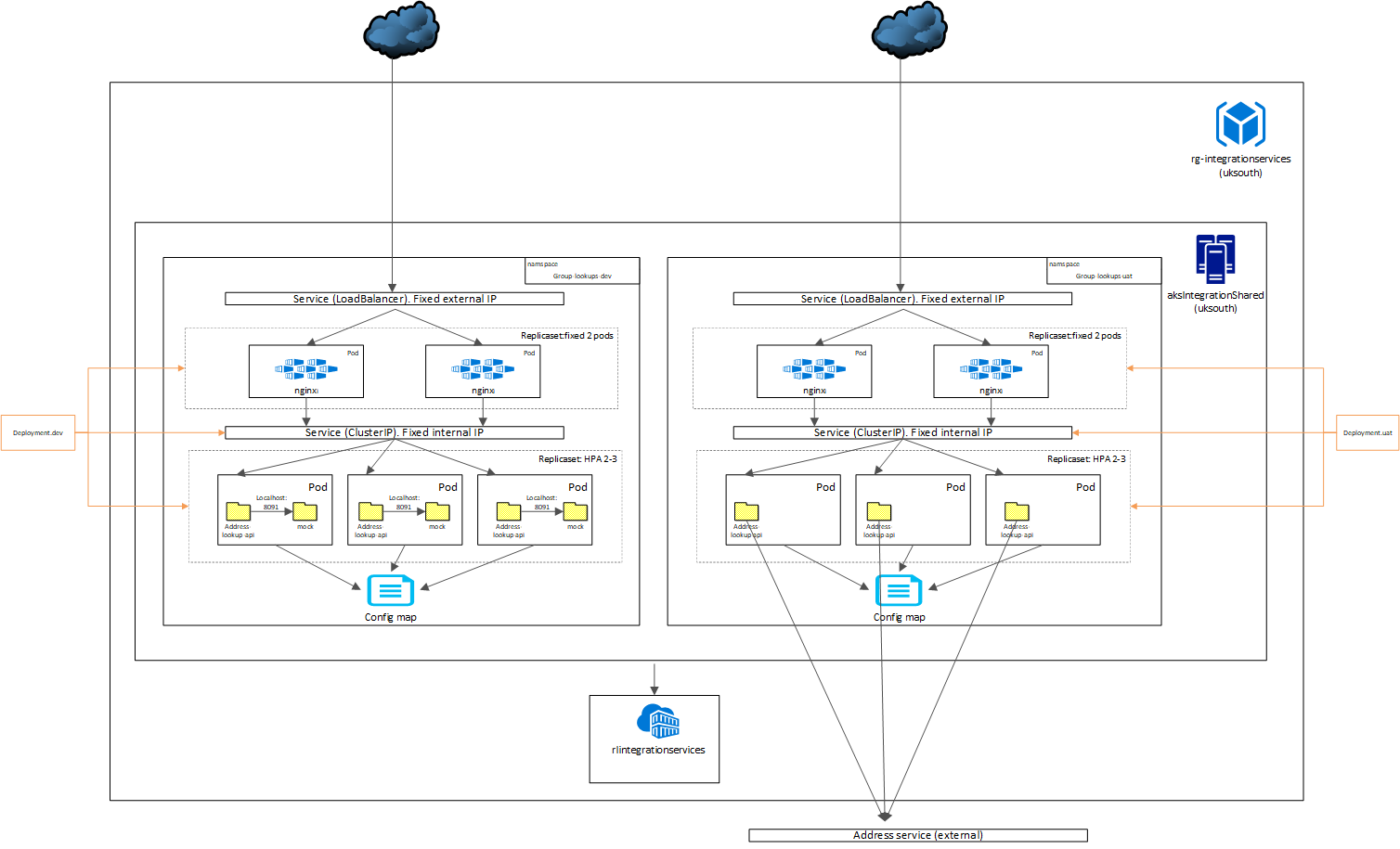The API Management service can be configured in a Virtual Network in internal mode, which makes it accessible only from within the Virtual Network. Azure Application Gateway is a PAAS Service, which provides a Layer-7 load balancer. It acts as a reverse-proxy service and provides among its offering a Web Application Firewall (WAF).
https://docs.microsoft.com/en-us/azure/key-vault/general/best-practices
https://docs.microsoft.com/en-us/azure/api-management/api-management-kubernetes
https://docs.microsoft.com/en-us/azure/aks/control-kubeconfig-access
https://docs.microsoft.com/en-us/azure/aks/availability-zones
https://docs.microsoft.com/en-us/azure/aks/operator-best-practices
https://docs.microsoft.com/en-us/azure/aks/developer-best-practices-resource-management-multi-region
The Kubernetes API server is how the underlying Kubernetes APIs are exposed. This component provides the interaction for management tools, such as kubectl or the Kubernetes dashboard. AKS provides a single-tenant cluster control plane, with a dedicated API server. By default, the API server is assigned a public IP address, and you should control access using Kubernetes role-based access control (Kubernetes RBAC) or Azure RBAC.
To secure access to the otherwise publicly accessible AKS control plane / API server, you can enable and use authorized IP ranges. These authorized IP ranges only allow defined IP address ranges to communicate with the API server. A request made to the API server from an IP address that isn't part of these authorized IP ranges is blocked. Continue to use Kubernetes RBAC or Azure RBAC to authorize users and the actions they request.
https://docs.microsoft.com/en-us/azure/aks/private-clusters https://github.com/paolosalvatori/private-aks-cluster
Address lookup API is a simple nodejs API exposed that allows a lookup of addresses based on a postcode match. It provides instructions for running locally, running on docker and running on a namespace in AKS.
The package.json provides a few commands to help. These work on Windows
There's also an artillery project coming along that will allow te ability to test scaling
https://vincentlauzon.com/2018/11/28/understanding-multiple-ingress-in-aks/
npm run docker-mock-build5
npm run docker-mock-run
npm install
npm run local
curl http://localhost:8080To run on 8080
npm run docker-image-build
npm run docker-run
curl http://localhost:8080Verify the hostname output matches the CONTAINER ID specified in thie command
docker container lsTo clean up images locally
npm run docker-container-rm-gracefulThis assumes the following:
integration-resource-group: 'rg-integration' integration-container-registry: 'rlintegrationservices'
Tag the image
npm run docker-image-tag
npm run docker-mock-tagaz login
az group list
az group create -n rg-integrationservices -l uksouth
az acr create --resource-group rg-integrationservices --name rlintegrationservices --sku Basic
az acr login --name rlintegrationservices
docker images
az acr repository list --name rlintegrationservices --output table
az acr repository show --name rlintegrationservices --image address-lookup-api:v0
az acr repository show --name rlintegrationservices --image address-lookup-api:v0
npm run docker-push-prod
npm run docker-mock-push-prod
az acr repository list --name rlintegrationservices --output table
az aks create --resource-group rg-integrationservices --name sharedintegrationservices --node-count 1 --generate-ssh-keys --attach-acr rlintegrationservices --api-server-authorized-ip-ranges 172.17.186.81/24
az aks get-credentials --resource-group rg-integrationservices --name sharedintegrationservices
az network public-ip show --resource-group MC_rg-integrationservices_sharedintegrationservices_uksouth --name 44890522-77ce-45bd-906a-a37c93261c59 --query id -o tsv
az aks browse --resource-group rg-integrationservices --name sharedintegrationservices
Run the following to see the resource group that the VMs are deployed
az aks show -g rg-integrationservices -n sharedintegrationservices --query nodeResourceGroup -o tsv
az network public-ip list -g MC_rg-integrationservices_sharedintegrationservices_uksouth --query [*].ipAddress
npm run k8s-yaml-generate-dev
kubectl apply -f namespace.dev.yaml
helm repo add ingress-nginx https://kubernetes.github.io/ingress-nginx
helm install nginx-group-lookups-dev ingress-nginx/ingress-nginx --namespace group-lookups-dev --set controller.replicaCount=2 --set controller.nodeSelector."beta\.kubernetes\.io/os"=linux --set defaultBackend.nodeSelector."beta\.kubernetes\.io/os"=linux --set controller.admissionWebhooks.patch.nodeSelector."beta\.kubernetes\.io/os"=linux --set controller.ingressClass=group-lookups-dev
az network public-ip list -g MC_rg-integrationservices_sharedintegrationservices_uksouth --query [*].ipAddress
kubectl --namespace group-lookups-dev get services
kubectl --namespace group-lookups-dev get services -o wide -w nginx-ingress-ingress-nginx-controller
kubectl get nodes
kubectl apply -f configmap.dev.yaml
kubectl apply -f deployment.dev.yaml
kubectl apply -f service.dev.yaml
kubectl apply -f ingress.dev.yaml
kubectl get pods --namespace group-lookups-dev
kubextl describe pod MY_POD
kubectl get service address-lookup-api --watch --namespace group-lookups-prod
kubectl get ingress group-lookups-ingress --namespace=group-lookups-prod
kubectl exec -it MY_POD --usr/bin/lillall my_app
kubectl get events --watch
kubectl exec -it thispod --container address-lookup-api-mock --/bin/ash
kubectl port-forward address-lookup-api-78fdc459f-44mrt 8080:8080
## AKS commands (prod) - on same cluster as dev but separated by namespace
npm run k8s-yaml-generate-prod
kubectl apply -f namespace.prod.yaml
helm repo add ingress-nginx https://kubernetes.github.io/ingress-nginx
helm install nginx-group-lookups-prod ingress-nginx/ingress-nginx --namespace group-lookups-prod --set controller.replicaCount=2 --set controller.nodeSelector."beta\.kubernetes\.io/os"=linux --set defaultBackend.nodeSelector."beta\.kubernetes\.io/os"=linux --set controller.admissionWebhooks.patch.nodeSelector."beta\.kubernetes\.io/os"=linux --set controller.ingressClass=group-lookups-prod
az network public-ip list -g MC_rg-integrationservices_sharedintegrationservices_uksouth --query [*].ipAddress
kubectl --namespace group-lookups-prod get services
kubectl --namespace group-lookups-prod get services -o wide -w nginx-ingress-group-lookups-prod
kubectl get nodes
kubectl apply -f configmap.prod.yaml
kubectl apply -f deployment.prod.yaml
kubectl apply -f service.prod.yaml
kubectl apply -f ingress.prod.yaml
kubectl get pods --namespace group-lookups-prod
kubectl get service address-lookup-api --watch --namespace group-lookups-prod
kubectl get ingress group-lookups-ingress --namespace=group-lookups-prod
kubectl get events --watch
kubectl exec -it thispod --container address-lookup-api-mock --/bin/ash
kubectl port-forward address-lookup-api-c8c57f855-k2bhg 8090:8090
>ls -l
Publish a version 1 and run the following cmd during update
FOR /L %L IN (0,0,1) DO @(curl http://20.77.128.2/ & timeout 15 & echo.)To run a load test, try npm run load-test (you'll have to change the ip address in the package.config). This will be usd to test autoscaling
az group delete -n rg-integrationservices
az group delete -n NetworkWatcherRG*Liveness
Decided to go TCP Might want to change the default timeouts for readiness in BW Might want to look at cmd or HTTP if any issues
Runs a diagnostc check on the container
Per container setting
ON filure the kublet will restart the container according to the container restart policy
GIves K8s a better understanding of our application
- Readiness probes
Run diagnostic checks agianst the containers in the pod
Per container setting
On start up, the ontainer won't receive trafic until ready (ie. readiness probe reports success)
Useful for applications that have a long start up time
Types of diagnostics checks (looks for success, failure or unknown)
EXec - measures the process exit code - ie exec something and look at exit code tcp socket - check whether we can successfully open port httpget - executes a check against a url and looks at returns code of 2* or 3*
kubectl get events --watch #run this to see what happens when we
-
networking - do this properly
-
TLS
-
logging/PVs/PVCs - Azure Service monitor
-
service mesh - Istio
-
Cluster scaling
-
DR
-
RBAC, service principles, auth - do this properly
